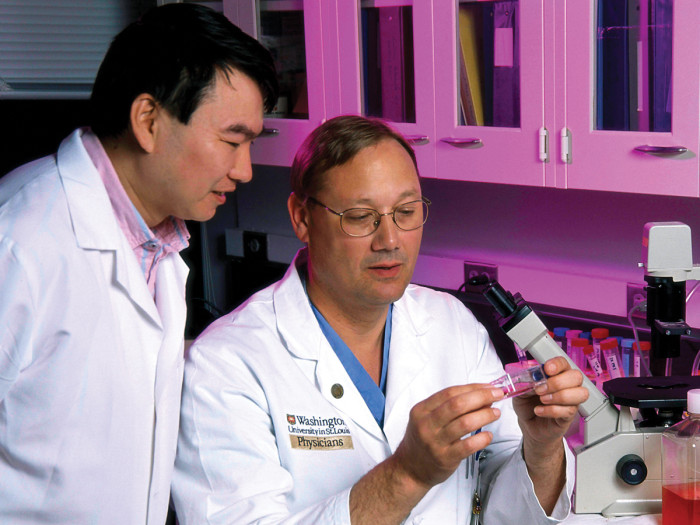Trial evaluates mechanisms driving five major cancer types
NIH grant makes Washington University the hub of national clinical trial

Under the leadership of David Mutch, MD (right), the Division of Gynecologic Oncology has expanded its mission of patient care, research and teaching.
A $2.5 million grant from the National Institutes of Health (NIH) has made Washington University the hub of a national clinical trial to identify the mechanisms driving five major cancer types.
The trial will evaluate the genomes and proteomes, or the set of proteins, which make up ovary, breast, colorectal, prostate, and head and neck cancer before and after therapy. The ultimate goal is to identify therapeutic targets and develop individualized therapies—particularly to address treatment-resistant tumors.
The grant establishes the Integrated Translational Genoproteomics Center, a virtual center led by Washington University and involving many collaborating institutions.
The center’s first task is to conduct five pilot studies, one for each cancer type, with 50 cancer patients each. Investigators will evaluate tissue samples from the patients, looking for changes in the expression of genes, RNA and proteins, says principal investigator David Mutch, MD, obstetrics and gynecology division chief at Barnes-Jewish Hospital and Washington University. Their objective is to identify ways in which individual patients’ tumors distinguish themselves from others’ and to use that knowledge to develop new treatments.
“There are no other studies comparing the genome and proteome before and after treatment in solid tumors or ovarian cancer,” says Mutch. “If we can use this approach to predict how people’s cancers are distinct and target that, we can more effectively treat them.”
The collaborating institutions will contribute tissue samples and provide intellectual input as the data emerges. Washington University will contribute tissue samples and conduct the analyses.
A better understanding of tumors
A major goal is to investigate what happens in the tumor during therapy.
“We want to understand how gene expression within tumors may change during treatment. Our study approach allows us to distinguish which clones of cells emerge from the chemotherapy and are thus resistant to it,” says Mutch.
The hope is that researchers eventually will be able to monitor tumor gene expression during therapy and immediately adjust treatment accordingly.
Another important focus will be to determine why many high-risk cancers return.
“In these cases, we want to understand the cells that were susceptible to the current treatment,” Mutch says. “And we want to shed light on what cells re-emerge and may be resistant to previous treatments. We hope to understand this new population of cancer cells and figure out how to eradicate them as well.”
Once the pilot projects are completed, the ultimate goal is for the center to expand its scope, with large clinical trial groups also contributing tumor tissue samples for analysis. “We are working toward nationwide tissue collection. Current collaborators will play a critical role in expanding this process and participating in future grants and studies as this concept expands,” Mutch says.
The U10 grant will provide funding for five years, and the center will seek other funding sources to continue its work past that time.
Integrated Translational Genoproteomics Center
Lead Investigators
- Breast Cancer
Lead Investigator: Matthew Ellis, PhD, MBChB, Baylor University
- Colorectal Cancer
Lead Investigator: Carmen Allegra, MD, University of Florida
- Head and Neck Cancer
Lead Investigator: Christine Chung, MD, Johns Hopkins University
- Ovarian Cancer
Lead investigators: Katherine Fuh, MD, PhD, and David Mutch, MD, Washington University
- Prostate Cancer
Lead Investigator: Felix Feng, MD, University of Michigan






